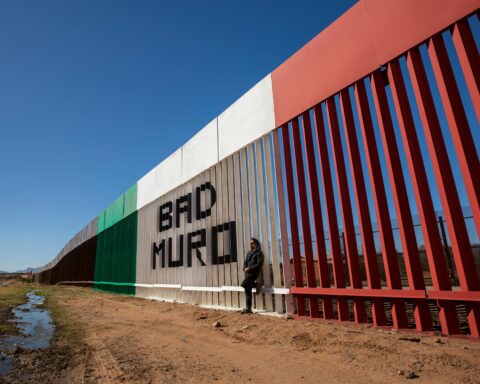Economic issues, deepening the relationship within the North American continent and the Canadian visa requirement for Mexicans, dominated the meeting held elected president of Mexico, Enrique Peña Nieto, and Canadian Prime Minister Stephen Harper, during his visit to Ottawa.
Harper and Peña Nieto met for two hours, including a working lunch in the Canadian Parliament building in Ottawa, a few days before the leader of the Institutional Revolutionary Party (PRI) takes possession of the Mexican Presidency.
After the meeting, the two leaders appeared at a joint press conference, in which they reaffirmed their willingness to deepen the already close economic and political relations between the two countries.
“I am delighted that even before his inauguration has decided to visit his Canadian friend,” Harper said to the media.
Prior to the start of the meeting, Peña Nieto had sent a message via his Twitter account in which he described Canada as a “strategic partner of Mexico.”
During their meeting, the first held by the two leaders, Peña Nieto said Canadian Prime Minister the outlines of his government program, especially in the economic and public safety.
Peña Nieto said the meeting, “the first opportunity” to meet, had been “very positive.”
For his part, Harper said the two countries “share deep connections on many levels. Mexico is the main tourist destination of Canadians travel. And for years, tens of thousands of Mexicans and their descendants have made Canada their country” .
Indeed, perhaps the most controversial topic of the meeting was the imposition in 2009 of visas to Mexican citizens visiting Canada, due to increased requests for shelter citizens of Latin American countries.
In the past three years, Mexico has tried to cancel the requirement to obtain a visa, but Canada has repeatedly refused.
Today, the two leaders discussed the issue again but during the press conference, Peña Nieto said if Harper had requested cancellation and only said he hopes the Canadian government to change its policy “in the short term.”
“I have expressed my interest on this tax to the Mexican visa. As Prime Minister Harper said, was the result of an excessive number of requests for shelter that perhaps were not real,” said Peña Nieto.
“We talked about the legislative changes (in Canada) and I hope that when the new law is approved in the near future be able to avoid this requirement,” said Mexican President-elect.
Harper confirmed that Canada is in the process of amending laws refuge in the country and said that he had discussed with Peña Nieto change, but was more vague about when Canada could cancel visa requirements.
“The president and I discussed it and we said our officials consider options step by step to resolve the situation. We would finally see that the trip from Mexico does not need visa,” said Harper.
Another issue that the two leaders discussed was the opening of the Mexican energy sector to foreign investors. Canada is one of the world powers in the exploration and development of natural resources and has a booming oil sector.
Before his meeting with Harper, Peña Nieto met with a group of Canadian business leaders, including representatives of the oil sector.
Mexican President-elect repeated during the press conference about wanting to change Mexican laws to allow entry of foreign investors in the Mexican energy sector “without privatizing” state company Pemex.
In that sense, Peña Nieto said that, in consensus with other political groups, would like to “see if I can get a legal change to ensure, without privatization of state enterprises, have greater private sector participation in infrastructure development in developing energy potential “of Mexico.
Peña Nieto defends in Canada increased North American integration
The elected president of Mexico, Enrique Peña Nieto, said he defended the need for greater integration of the North American countries during his meeting this day in Ottawa with Prime Minister Stephen Harper.
During a press conference held after the meeting, Peña Nieto also said the two leaders discussed the visa imposition imposed by Canada in 2009 to Mexican citizens and hoped that in the “near term,” the Canadian government set aside that requirement.
Peña Nieto said he was interested in working “together” to improve the competitiveness of the North American region.
Mexican President-elect added, “the proposal that my government will provide for America is to further integration. This will allow us to improve our competitiveness and promote the creation of more jobs, which is one of the most important issues for the two countries.”
Peña Nieto also stated that Harper had tried to tax the visa in 2009 to Mexican citizens who want to travel to Canada.
“I have expressed my interest on this tax to the Mexican visa. As Prime Minister Harper has said was the result of an excessive number of requests for shelter that perhaps were not real” Peña Nieto said.
“We talked about the legislative changes (in Canada) and I hope that when the new law is approved in the short term, we are able to avoid this requirement,” said Mexican President-elect.
Peña Nieto also addressed the opening of the Mexican energy sector to foreign investors, something that Canada, one of the world leaders in investment and development of raw materials, is particularly interested.
The leader of the Institutional Revolutionary Party (PRI) reiterated that he is interested in the entry of foreign investors but are not “privatization” of state energy companies.
Peña Nieto said in consensus with other political groups, “I like to see if I can get a legal change to ensure, without privatization of state enterprises, have greater private sector participation in infrastructure development to develop the energy potential” Mexico.
Eduardo Urueña is director of El Popular, Canada’s only Hispanic national daily newspaper, based in Toronto.




